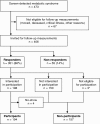Remission of screen-detected metabolic syndrome and its determinants: an observational study
- PMID: 22971223
- PMCID: PMC3491000
- DOI: 10.1186/1471-2458-12-778
Remission of screen-detected metabolic syndrome and its determinants: an observational study
Abstract
Background: Early detection and treatment of the metabolic syndrome may prevent diabetes and cardiovascular disease. Our aim was to assess remission of the metabolic syndrome and its determinants after a population based screening without predefined intervention in the Netherlands.
Methods: In 2006 we detected 406 metabolic syndrome cases (The National Cholesterol Education Program's Adult Treatment Panel III (NCEP ATP III) definition) among apparently healthy individuals with an increased waist circumference. They received usual care in a primary care setting. After three years metabolic syndrome status was re-measured. We evaluated which baseline determinants were independently associated with remission.
Results: The remission rate among the 194 participants was 53%. Baseline determinants independently associated with a remission were the presence of more than three metabolic syndrome components (OR 0.46) and higher levels of waist circumference (OR 0.91), blood pressure (OR 0.98) and fasting glucose (OR 0.60).
Conclusions: In a population with screen-detected metabolic syndrome receiving usual care, more than half of the participants achieved a remission after three years. This positive result after a relatively simple strategy provides a solid basis for a nation-wide implementation. Not so much socio-demographic variables but a higher number and level of the metabolic syndrome components were predictors of a lower chance of remission. In such cases, primary care physicians should be extra alert.
Figures
Similar articles
-
Prevalence and determinants of metabolic syndrome in Qatar: results from a National Health Survey.BMJ Open. 2016 Sep 6;6(9):e009514. doi: 10.1136/bmjopen-2015-009514. BMJ Open. 2016. PMID: 27601485 Free PMC article.
-
Metabolic syndrome and gallstone disease.World J Gastroenterol. 2012 Aug 21;18(31):4215-20. doi: 10.3748/wjg.v18.i31.4215. World J Gastroenterol. 2012. PMID: 22919256 Free PMC article.
-
First nationwide study of the prevalence of the metabolic syndrome and optimal cutoff points of waist circumference in the Middle East: the national survey of risk factors for noncommunicable diseases of Iran.Diabetes Care. 2009 Jun;32(6):1092-7. doi: 10.2337/dc08-1800. Epub 2009 Mar 11. Diabetes Care. 2009. PMID: 19279302 Free PMC article.
-
The reliability of the National Cholesterol Education Program's Adult Treatment Panel III (NCEP/ATP III) and the International Diabetes Federation (IDF) definitions in diagnosing metabolic syndrome (MetS) among Gaza Strip Palestinians.Diabetes Metab Syndr. 2012 Jan-Mar;6(1):4-8. doi: 10.1016/j.dsx.2012.05.017. Epub 2012 Jun 7. Diabetes Metab Syndr. 2012. PMID: 23014247 Clinical Trial.
-
Metabolic syndrome.Pediatr Rev. 2012 Oct;33(10):459-66; quiz 467-8. doi: 10.1542/pir.33-10-459. Pediatr Rev. 2012. PMID: 23027600 Free PMC article. Review. No abstract available.
Cited by
-
Impact of Worsened Metabolic Syndrome on the Risk of Dementia: A Nationwide Cohort Study.J Am Heart Assoc. 2017 Sep 12;6(9):e004749. doi: 10.1161/JAHA.116.004749. J Am Heart Assoc. 2017. PMID: 28899896 Free PMC article.
-
Metabolic Unhealthiness Increases the Likelihood of Having Metabolic Syndrome Components in Normoweight Young Adults.Int J Environ Res Public Health. 2019 Sep 5;16(18):3258. doi: 10.3390/ijerph16183258. Int J Environ Res Public Health. 2019. PMID: 31491867 Free PMC article.
-
Comparison of perceptions of obesity among adults with central obesity with and without additional cardiometabolic risk factors and among those who were formally obese, 3 years after screening for central obesity.BMC Public Health. 2015 Dec 7;15:1214. doi: 10.1186/s12889-015-2544-1. BMC Public Health. 2015. PMID: 26644013 Free PMC article.
References
-
- Hansson L, Lindholm LH, Niskanen L, Lanke J, Hedner T, Niklason A, Luomanmaki K, Dahlof B, Morlin C, Karlberg BE, Wester PO, Bjorck JE, De FU. JE: Effect of angiotensin-converting-enzyme inhibition compared with conventional therapy on cardiovascular morbidity and mortality in hypertension: the Captopril Prevention Project (CAPPP) randomised trial. Lancet. 1999;353:611–616. doi: 10.1016/S0140-6736(98)05012-0. - DOI - PubMed
Publication types
MeSH terms
LinkOut - more resources
Full Text Sources
Medical


